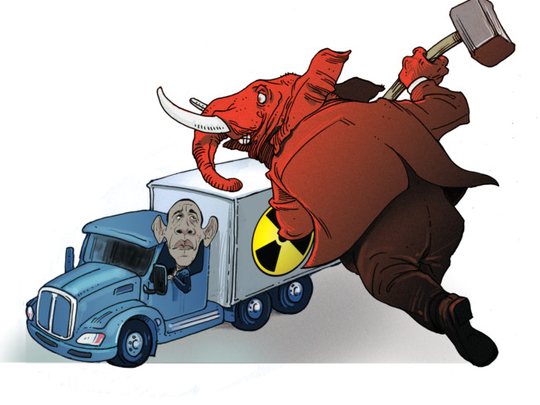
The negotiators on the Iran nuclear deal bust their own deadline as they continue their talks with both sides saying that they are close to a deal. Despite politicians on both sides making inflammatory speeches for their domestic markets, it has been remarkable how little has leaked on the details of the talks.
Any deal as complicated as this must involve a delicate structure of give-and-take over a large range of issues including enrichment capacity, uranium stocks, access to technologies, verification access, and the timing and range of sanctions relief, and the snap-back mechanisms in case it all goes wrong in the future.
This means that any comment on one aspect of the deal should recognise the entirety, but this subtlety may not survive the imminent public and parliamentary scrutiny in Iran and the US as politicians anxious to make their own arguments will pick on narrow issues.
And this debate will continue for a long time as any implementation of the deal will not happen quickly. Even if US Secretary of State John Kerry and Iranian Foreign Minister Mohammad Zarif announce an agreement soon, nothing will happen the next day.
Sanctions relief
Iran will have to implement the actions it will have promised, they will need to be verified, and only then will the sanctions start to lift.
Any wide reaching sanctions relief will take years for Iran’s actions to be seen and verified and the legal processes to be implemented.
All the while, the Congress in Washington and politicians in Tehran will continue to comment on events and some of the arguments are already becoming clear. In the US, the Republicans are going to use this deal as ideal material to hammer the Democrats in the presidential elections, accusing Obama of a sell-out.
Republican leader in the Senate, Mitch McConnell, wrote a ferocious piece in Politico this week misrepresenting the talks as seeking “the best deal acceptable to Iran, rather than actually furthering our goal of ending Iran’s nuclear programme,” although neither statement represents the reality.
He then added the jibe that “establishing an internationally recognised Iranian nuclear programme is not in the interest of the American people. But it now seems to be the premise upon which the Obama administration is approaching these talks”.
McConnell added that that the Obama administration intends to muddle into an unacceptable deal with Iran and the current course would “grant Iran additional legitimacy as it seeks to blame the West for anything short of instantaneous sanctions relief. It would also allow Iran to continue to press for additional concessions on verification and disclosures on the possible military dimensions of its nuclear research. And that Iran would use funding derived from any sanctions relief to support proxy forces and advance its stockpile of missiles”.
Public support for deal in US
When Obama goes to Congress to argue against McConnell’s misrepresentation, he will be cheered by a by a 2-to-1 margin in favour of a deal amongst the American public, according to a NBC News/Wall Street Journal poll that found that more Americans support the United States and other world powers pursuing a nuclear deal with Iran than oppose it.
Thirty-six per cent of respondents backed the deal and 17 per cent opposed it, but an alarming 46 per cent said that they did not know enough to have an opinion, which may also mean they do not care very much, but certainly means that all the noise and fury over the deal has passed them by. The arguments in the US have been based solely on security issues and have largely ignored any other effects.
But Iran sees the deal from a more economic standpoint as President Hassan Rouhani’s internationalists try to overcome their isolationist opponents as they seek an economic revival.
Some of this hoped-for revival has been looked at by Esfandyar Batmanghelidj in lobelog.com in an analysis of post-sanctions windfall in Iran being domestically driven by private domestic investment from newly confident Iranian investors, who could transform Iran’s political economy for the better.
Repairing broken relationship
“A nuclear deal will actually help repair the broken relationship between consumption, savings, and private investment in Iran,” he said, noting the 2012 sanctions caused Iran’s gross national savings to fall from 45 per cent of GDP in 2011 to just 33 per cent in 2015, according to the International Monetary Fund, which has drastically limited capital available for business to invest for the future.
But Batmanghelidj goes beyond what Rouhani may be thinking about when he sees profound social effects emerging from a strong economy.
“The greater the degree to which the full range of Iranian citizens, who currently inhabit separate political and economic classes, invest in a marketplace like the Tehran stock exchange, the less reliant on patronage networks they become. Instead, everyone from schoolteachers to Revolutionary Guard commanders will become shareholders of a more political neutral type of capital. The segregation within Iran’s political economy, determined by the sources from which people earn their livelihoods and derive their wealth, will diminish as a prima facie structural reason for political antagonism between citizens,” said Batmanghelidj.
This may be true, and it would be a very hopeful development with profound implications for the Middle East, but this argument will not be part of Obama’s arguments with McConnell as they stick to the security issues.










